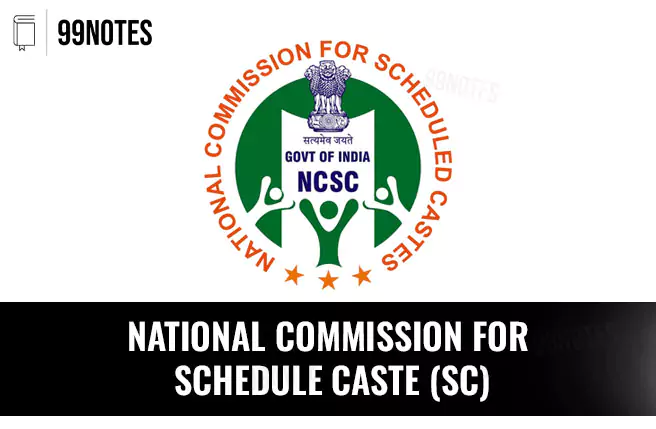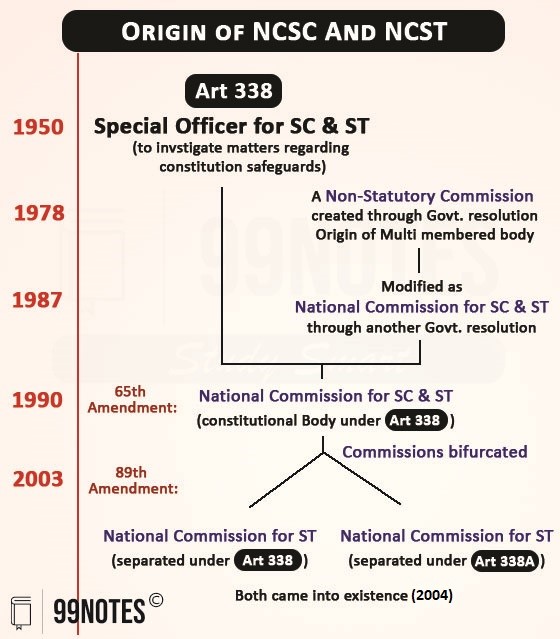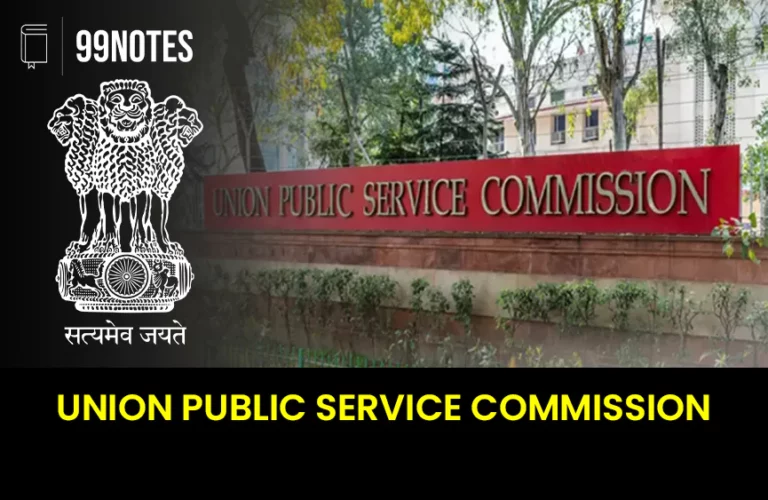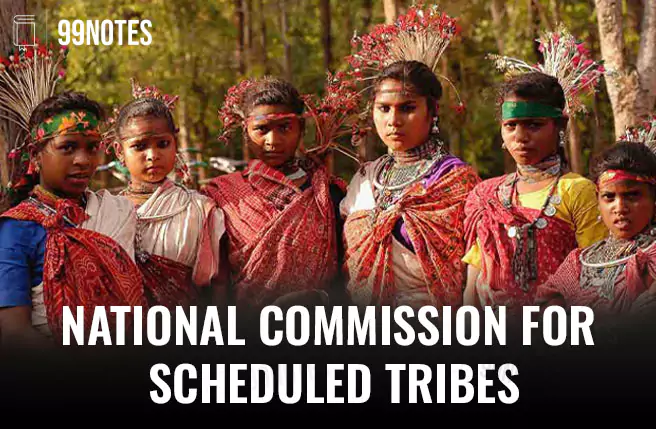National Commission for Scheduled Caste (SC)- UPSC Notes
The National Commission for SCs is an Indian constitutional body established under Article 338 to safeguard Schedule Tribes and Anglo-Indian Communities against exploitation and protect and promote their interests.
What is Schedule Caste? |
| The term “scheduled caste” was coined by the Simon Commission (1927). This term first time appeared in the Government of India Act, 1935. Later, the British Government issued the Government of India (scheduled Castes) order, 1936, stating certain Castes, which are socially disadvantaged castes, as a “scheduled Caste”.
Prior to this, they were known as the Depressed Classes. The depressed classes were systematically categorised in 1931 census. After this, the list is notified by the President in the view of Article 341 (gives power to the President to declare certain castes as a scheduled caste in the union territory or state.) |
The Evolution of the Commission:
For the welfare of the scheduled caste and the effective implementation of various safeguards provided in the constitution. Under Article 338, the National Commission for SCs was established as a Constitutional Body.
Originally, though, it started to function as a single special officer, whereas over the years, it functions as a multi-member body:
- Appointment of a Special Officer: Originally, under Article 338 of the constitution, a special officer was appointed to investigate matters relating to the constitutional safeguards for the SCs and the STs. The special officer was designated as a commissioner of SC and ST.
- Non-Statutory Multi-Member Commission: A special officer was not enough to implement safeguard policies for the SC and STs. Therefore, a Non-Statutory multi-member commission was created by the Government by passing a resolution in 1978, whereas the office of commissioner for SCs and STs continued to exist.
- This was renamed the National Commission for SCs and STs, and the Government modified the function of the Commission by passing a resolution in
- 65th Constitutional Amendment Act, 1990: A high-level multi-member body for SCs and STs was established in place of a single special officer for SCs and STs. It abolished the Commissioner for SCs and STs as well as the Commission, which was set up under the resolution of 1987.
- 89th Constitutional Amendment Act, 2003: A single commission was inadequate to monitor the constitutional safeguards of SCs and STs, and therefore, this act divided the single National Commission for SCs and STs into two separate bodies, i.e.,
- National Commission for Schedule Caste under Article 338 and
- National Commission for Scheduled Tribes(NCST) under Article 338-A.
Article 338 (Present scenario):
- Composition of the National Commission for SCs: It includes a chairperson, a vice chairperson, and three other members.
- Appointment: the members are appointed by the President by warrant under his hand and seal.
- Qualification: as per the National Commission for Scheduled Castes Chairperson, Vice-Chairperson and members (Conditions of Services and Tenure) rules, 2004,
- The members shall be appointed from amongst persons of ability, integrity, and standing who had a record of selfless service to the cause of justice for the Scheduled Castes.
- The chairperson shall be appointed from amongst eminent sociopolitical workers belonging to the SC.
- Vice-Chairperson and all other members, out of whom at least two shall be appointed from amongst persons belonging to the SC.
- At least one other member shall be appointed from amongst
- Condition of Service and Tenure of Office: The constitution empowers the President of India to determine the condition of services and tenure of the members.
- Term of office: The members of the Commission hold office for a term of three years, as per “The National Commission for Scheduled Castes Chairperson, Vice-Chairperson and Members (Conditions of service and Tenure) Rules, 2004” made by the President.
- Resignation: The chairperson, and Vice-Chairperson, and any other member may resign from their posts, writing to the President.
- Removal: The chairperson shall only be removed from his office by the President’s order on the grounds of misbehaviour after the Supreme Court’s enquiry.
- The members of the Commission can only be appointed for a maximum of two terms.
- Suraj Bhan was the First chairman of the National Commission for Scheduled castes. Until now, 6 National Commissions for scheduled Castes have been constituted.
Functions of the National Commission for Scheduled Castes:
Following functions have been enumerated under Article 338(5) of the constitution of India:
- Investigates matters related to safeguards: The Commission monitors and looks into issues relating to the protections outlined in the constitution for the schedule castes or under any government order to evaluate the workings of such safeguards.
- Inquires into specific complaints: The Commission looks into the particular complaints related to the deprivation of rights and safeguards of the Scheduled castes (SCs).
- Evaluate Development Progress: The Commission reviews the progress of the Scheduled Caste development under the Union or a state, as well as participates in and provides input on the planning process for their development.
- Presents Annual Report to the President: The Commission may submit the report annually or at other times as the constitution may specify to the President on the working of the safeguards.
- Recommends Union or States: recommends Union or to any state regarding the effective implementation of the safeguards and the protection. Recommendations of the Commission are only advisory, not mandatory in nature.
- Consultation Function: Both the Union government and state governments should consult the Commission on all the related major policy matters that affect the schedule castes.
- Providing Constitutional Safeguard: The Commission also looks into the issues relating to the constitutional and other legal safeguards for the
- Anglo-Indian community and submits a report to the President on their workings.
- Until 2018, the Commission was responsible for discharging similar functions related to the Other Backward Classes (OBCs). The Commission was relieved from this responsibility by the 102nd Amendment Act 2018.
- Other functions: Fulfills the functions related to the welfare, development advancement and protection of the Scheduled Castes as deemed fit by the President or any law.
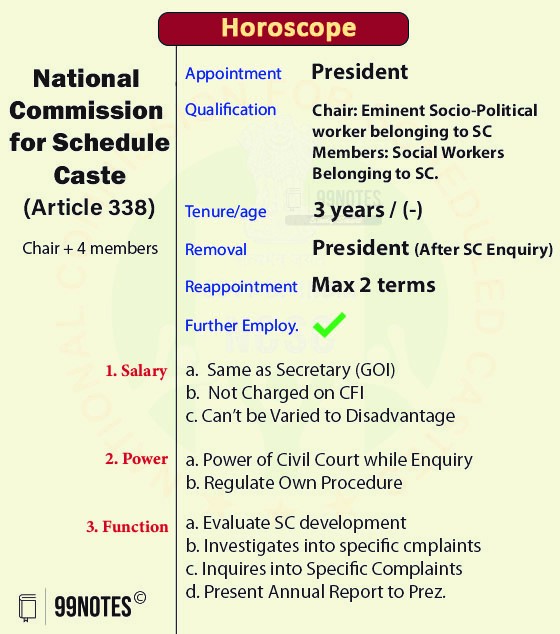
Report of the National Commission for SCs:
It is the Commission’s responsibility to present a report to the President annually, and the Commission may also submit a report whenever it deems fit.
- The President places it in the parliament: All of these reports are presented to the parliament by the President together with a memorandum outlining the steps taken in response to the Commission’s recommendation.
- It must include the rationale for the rejection of every one of these recommendations.
- The President forwards it to the governor: It is also the President’s responsibility to forward any report of the Commission appropriated by the state government to the governor.
- The governor further places it before the state legislature, along with a memorandum of the action taken on the recommendations of the Commission.
- The memorandum also includes the rationale for the rejection of this recommendation.
Powers of the Commission:
Under Article 338(4) of the constitution, the Commission can regulate its own procedure for the purpose of investigation and enquiry into the working of the safeguards, and it has all the powers of a civil court.
The powers of the Commission are as follows:
- It can examine a person on oath.
- It can summon and enforce the attendance of any person and examine on oath
- It can discover and produce any documents and receive evidence on affidavits.
- Obtaining any public record from a court or office.
- It can issue summon for the examination of witnesses and documents
- Any other matter which the President may determine.
Evaluation role of the National Commission for Scheduled Caste:
There are several areas of concern with regard to the working of the National Commission for Scheduled Caste:
- Issue in the appointment: There is a lack of institutionalisation in the appointment procedure, which has led to the appointment of political persons in the offices. Also, vacancies need to be filed timely.
For example, NCSC has yet to have a chairperson since February 2022.
- Rise in Dalit atrocities: As per the statistics provided in the NCRB report, atrocities and Crimes against Scheduled Castes(SC) have increased by 1.2% in 2021 (50,900) over 2020 (50,291 cases). This shows the operational issues in the NCSC to safeguard the Scheduled castes.
- Delays in investigations: As there is a lack of research capacity to carry out an investigation, there are delays in inquiry.
- Toothless body: Commission is often criticised as the toothless tiger. For example, NCSC does not take punitive measures or award compensation on cases related to Schedule Castes. The Commission only recommends the cases to the concerned authorities to take punitive actions/grant compensations as per the law.
- Only advisory in nature: As its decisions are only advisory and not mandatory in nature, it can only be effective when responsible authorities take timely steps to implement the recommendations.
- Elitist biases: The Commission has been in complete contrast to its approach towards atrocities and is often criticised for having elitist biases. The Commission generally supports the Government’s position.
- The reports of the Commission are not tabled in the parliament on a regular basis; even if they are tabled, they are not discussed.
- Ineffective in Behavioral Changes: the Commission has not been effective in bringing behavioural change in society, as in cases like Dalit Lynching in Una, honour killings, etc.
Way forward:
- Second ARC recommendations: it recommends the creation of a separate parliamentary committee for all commissions for deliberations to improve parliamentary oversight and ensure parliamentary effectiveness.
- Capacity building programmes: quality of report along with quality data matters, so steps for capacity building of the person are required.
- Make a more accountable Commission: There is a need for a holistic internal structure to make a more accountable Commission.
For example, data on the monitoring of the cases should be made digitally available to make them more accountable. Also, empower them to grant compensation.
- Need to strengthen judicial and legal matters: There is a need to strengthen legal and judicial protection for Dalits, a need to develop standard operating procedures, and a need to build the capacity of judges and lawyers.
For example, Monitor the investigation undertaken by the Police and ensure fast-track trial of cases and speedy delivery of justice.
- Change in attitude: The Commission has to change its priorities, which are visibly tilted in favour of the elite class. It has to engage in internal scrutinisation, etc.
- Protection for the families of the victim: SCs succumb to the pressure of the high class. Thus, there is a need for protection.
For example, institutionalise a three-fold protection mechanism to protect the families of the victim from any pressure, as in the case of Hathras.
Conclusion:
The National Commission for Scheduled Caste plays a crucial role in safeguarding the interests of scheduled castes. It has made significant efforts to improve their condition. However, a lot needs to be done in terms of making a more conscious effort to improve their implementation of recommendations and the required effective involvement of civil society.

